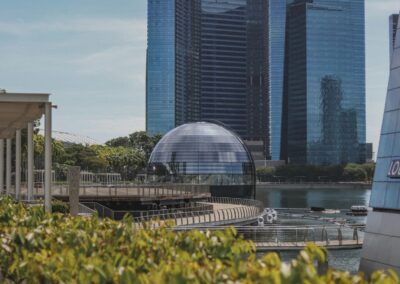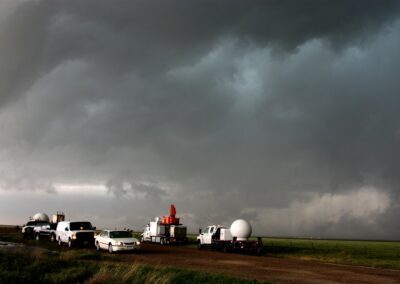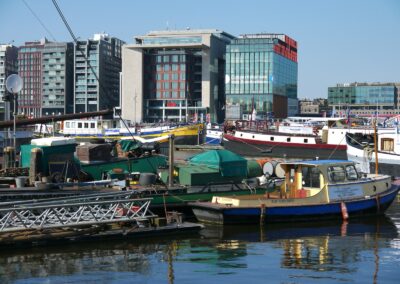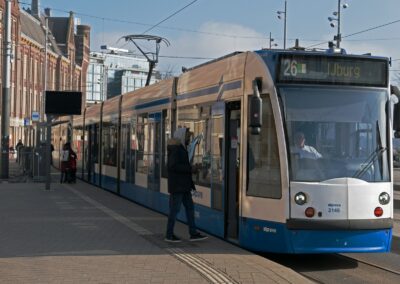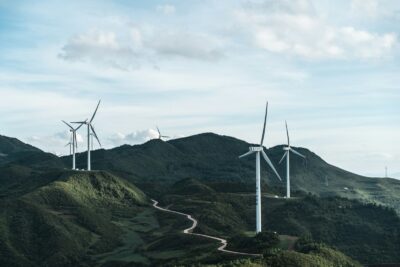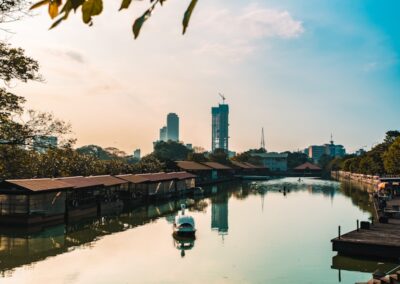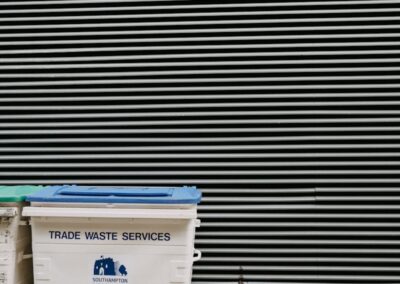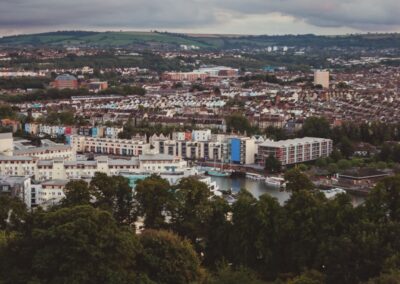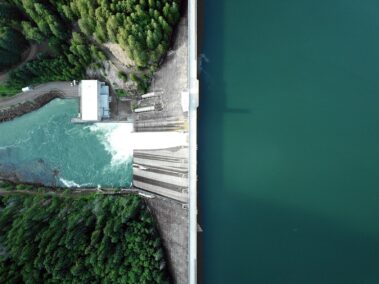Driving Sustainability Through Advanced Technologies
Revolutionizing Urban Development with AI
Technological innovations in floating cities are revolutionizing urban development, driving sustainability, and enhancing efficiency and resilience. One of the key technologies leading this transformation is artificial intelligence (AI). AI-powered systems can optimize various aspects of city management, from energy consumption to traffic flow. In regions like Dubai and Riyadh, where urban expansion is rapid, AI can significantly improve the sustainability and livability of floating cities.
AI systems can monitor and manage energy usage in real-time, reducing waste and lowering costs. For example, smart grids powered by AI can distribute electricity more efficiently, adapting to changes in demand and integrating renewable energy sources seamlessly. In a floating city, where space and resources are limited, this efficient energy management is crucial for maintaining sustainability.
Moreover, AI can enhance the resilience of floating cities by predicting and mitigating the impacts of natural disasters. By analyzing data from weather patterns and environmental sensors, AI systems can forecast potential threats and trigger automated responses to protect infrastructure and residents. This proactive approach can significantly reduce the damage caused by extreme weather events, making floating cities safer and more resilient.
Blockchain for Transparent and Secure City Management
Blockchain technology is another innovation driving sustainability and efficiency in floating cities. Blockchain provides a transparent and secure way to manage data, ensuring accountability and trust among stakeholders. In Saudi Arabia and the UAE, where technological advancements are embraced, blockchain can play a vital role in the development of floating cities.
One of the primary applications of blockchain in floating cities is in the management of resources and services. For instance, blockchain can be used to create a decentralized system for tracking energy consumption and carbon emissions. This system can provide real-time data to city managers and residents, promoting transparency and encouraging sustainable practices.
Blockchain can also enhance the security and efficiency of financial transactions within floating cities. Smart contracts powered by blockchain can automate and secure transactions, reducing the need for intermediaries and lowering costs. This efficiency can attract businesses and investors to floating cities, driving economic growth and development.
The Metaverse and Generative AI for Urban Planning
The metaverse and generative AI are emerging technologies that can transform the way floating cities are planned and developed. The metaverse, a virtual shared space created by the convergence of virtually enhanced physical reality and physically persistent virtual reality, can provide a platform for collaborative urban planning and design.
Urban planners can use the metaverse to create virtual models of floating cities, allowing stakeholders to explore and interact with the designs before they are built. This immersive experience can facilitate better decision-making and ensure that the needs and preferences of residents are considered. In Dubai and Riyadh, where innovation in urban development is a priority, the metaverse can enhance the planning and implementation of floating cities.
Generative AI can further enhance urban planning by creating optimized designs based on specific criteria. By analyzing data on environmental conditions, resource availability, and resident preferences, generative AI can produce design solutions that maximize efficiency and sustainability. This technology can help create floating cities that are not only functional and beautiful but also resilient and sustainable.
Enhancing Efficiency and Resilience in Floating Cities
Sustainable Energy Solutions
Sustainable energy solutions are crucial for the efficiency and resilience of floating cities. Renewable energy sources such as solar, wind, and tidal power can provide clean and reliable energy for floating cities, reducing their dependence on fossil fuels and lowering carbon emissions. In Saudi Arabia and the UAE, where solar energy is abundant, floating cities can harness this resource to power their infrastructure sustainably.
Energy storage solutions such as advanced batteries and supercapacitors are also essential for maintaining a stable energy supply. These technologies can store excess energy generated during peak production times and release it when demand is high, ensuring a consistent and reliable power supply. By integrating renewable energy sources with advanced storage solutions, floating cities can achieve energy independence and resilience.
In addition to renewable energy, floating cities can implement energy-efficient technologies to reduce consumption. Smart lighting, heating, and cooling systems can adapt to occupancy and environmental conditions, minimizing energy use without compromising comfort. These technologies can significantly lower energy costs and enhance the sustainability of floating cities.
Water Management and Conservation
Effective water management is another critical aspect of sustainability in floating cities. Advanced technologies can optimize water usage and ensure a reliable supply of clean water. Desalination plants powered by renewable energy can convert seawater into freshwater, providing a sustainable source of drinking water for floating cities. In Dubai and Riyadh, where water scarcity is a significant concern, desalination can be a vital solution.
Water recycling and conservation technologies can further enhance the sustainability of floating cities. Greywater systems can treat and reuse wastewater for non-potable purposes such as irrigation and toilet flushing, reducing the demand for freshwater. Smart irrigation systems can optimize water usage in green spaces, ensuring that plants receive the right amount of water without waste.
Moreover, floating cities can implement advanced drainage and flood management systems to protect against extreme weather events. Permeable surfaces, green roofs, and rainwater harvesting systems can reduce runoff and prevent flooding, enhancing the resilience of floating cities. These technologies can ensure that floating cities remain safe and habitable even in the face of climate change.
Building Resilient Infrastructure
Resilient infrastructure is essential for the long-term success of floating cities. Advanced construction materials and techniques can enhance the durability and stability of floating structures, ensuring that they can withstand environmental stresses. In Saudi Arabia and the UAE, where extreme weather events are becoming more frequent, resilient infrastructure is crucial for protecting residents and assets.
Floating cities can use innovative materials such as self-healing concrete, which can repair cracks and extend the lifespan of structures. Modular construction techniques can enable rapid and efficient building, allowing cities to adapt quickly to changing needs. These techniques can also minimize waste and disruption during the construction process, promoting sustainability.
Moreover, floating cities can implement smart infrastructure systems that monitor and manage the condition of buildings and utilities in real-time. Sensors embedded in structures can detect signs of wear and damage, triggering maintenance and repairs before problems become severe. This proactive approach can enhance the safety and longevity of floating cities, ensuring that they remain functional and resilient for generations.
Conclusion: Pioneering Sustainable Urban Development
In conclusion, technological innovations are driving the development of sustainable, efficient, and resilient floating cities. By leveraging advanced technologies such as AI, blockchain, the metaverse, and generative AI, cities like Riyadh and Dubai can create urban areas that promote environmental sustainability and enhance the quality of life for residents. For business executives, mid-level managers, and entrepreneurs, investing in these innovations presents an opportunity to drive business success while contributing to the well-being of our planet. By prioritizing sustainability, efficiency, and resilience, regions like Saudi Arabia and the UAE can lead the way in pioneering sustainable urban development.
#FloatingCities #TechnologicalInnovations #Sustainability #Efficiency #Resilience #AI #Blockchain #Metaverse #GenerativeAI #ModernTechnology #BusinessSuccess #Leadership #ManagementSkills #ProjectManagement #SaudiArabia #UAE #Riyadh #Dubai



